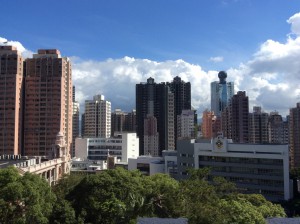
July 17, 2015, by sustainablenottingham
International Sustainable Campus Network Conference 2015 (Day 2)
Regional Perspectives on Global Change
Andy Nolan continues his coverage of the ISCN conference:
John Robinson, Assoc Provost, Sustainability, University of British Columbia opened the morning’s dialogue session with a positive challenge to delegate, showing how, as a sizeable organisation with single ownership, a public mandate and an those around teaching and research, there is no better organisation to lead sustainable change within a region.
Dependent on this is the culture within the university … But … There is a profound difference between ‘the university’ and ‘the faculty’ (defined by John as ‘academic’ and ‘operational’). The solution, of course, is to integrate the two so that the contribution of the support/operational services is recognised as is the contribution of academic communities to the direction of the university as well as their own faculty or research group.
To facilitate change, it is important to move from a narrative that is about damage limitation and mitigation to one of net positive where the future is painted as positive, innovative, and much broader than just environmental so that social and economic factors are so much better integrated in to the strategy. The objective is to move towards ‘regenerative sustainability’ where there is simultaneous improvement in human and environmental wellbeing.
- British Columbia has consciously made an effort to adopt their campus as a living laboratory where the assets, spaces, infrastructure, people, services are used as part of the academic research and teaching programmes. The climate change (energy) targets have shown a 20,000t co2e reduction since 2007. $150m capital investment made by the UBC Board over the period 2007-2015 to achieve this.
- UBC’s teaching and learning vision gives every student the opportunity to engage in a formal learning programme of sustainability. Each of its graduates leaves a little more informed and inspired and informed on sustaianability.
An active travel programme underpins the engagement programme with the UBC now turning car parking areas into housing, with a greater return on those investments.
Jeanne Ng, China Light and Power, as keynote showed how democracy and a diversity of opinions is a key challenge to decision makers. Social media is accelerating the ways in which people are engaged in the debate but also recognising that shareholders hold more influence than most. Whilst environmental performance and decision making can be objective, social issues are far more subjective and emotive. Human rights, ethics, corporate governance, labour practice, etc are wide open to interpretation and are more complex than they at first appear.
TREES – monitoring drivers of change: technology, regulation, economics, environmental and social – against a background of changing expectation, aspiration in emerging economies.
Equity constraints in carbon emissions intensity remains a key issue. Access to available, but higher intensity, fossil fuels, in developing countries and economies has seen per capita emissions grow.
Reporting performance on a range of metrics around sustainability seen as key to performance improvement at China Light and Power. Internally, the company was able to identify gaps in performance between parts of the group across the whole business.
CPL sustainability unit adopted the mantra innovate, incubate and integrate in response to their sustainability challenge.
Marcelo Fernandez, Chancellor of the International University of Ecuador, gave an overview of the nation of Ecuador with a Pacific facing population of 16m highly dependent on hydro electricity (75%) and therefore the bulk of its emissions contribution is from transport. Despite that, the country is facing the consequences of a warming climate – particularly on the Galápagos Islands.
UIDE seeks to develop a research centre campus on Santa Cruz, in the Galápagos. Increasing pressure and impact from tourism, which is steadily rising. Just 3% of the land of the Galápagos is occupied by people – the rest are protected by the Reserve. It provides the opportunity for a natural laboratory. UIDE has purchased 85ha of land to undertake this work – with 20ha identified for built facilities for the research to be undertaken, including residences. Of course, the aspiration is to build an exemplar of sustainable construction with teaching rooms, laboratories, residences, included. UIDE are now seeking to raise the finance for the project.
Gitile Naituli, from the Multimedia University of Kenya, reminded the conference that the starting point and perspective from African nations is very different. With many nations considering themselves at the ‘start’ of their journey although often more in-tune with their natural environment. Often the traditional ways of developing were better than the ‘innovations’ that have been introduced since.
The challenge now is to assist decision makers, investors, students, families, communities in how to live sustainably without, necessarily, following the path of ‘so-called’ developed nations. To remember the ways in which these communities were sustained in the past is to sustain it in the future.
Rene Schwarzenbach, ETH Zurich, set out the challenge that universities are still at the margins and not making the contribution to global sustainability they should. He set out a number of challenges:
- Make sure all students are trained in systems thinking and critical thinking around sustainability
- Reward inter-disciplinary and research – not punish it using a more comprehensive approach to evaluation that isn’t sullied by rankings and the quest for an increase in publications by volume but not by their comprehensiveness.
Again, Rene made the call for the use of campuses as living laboratory for research and teaching and to engage with wider society. Is there enough courage for fundamental cultural change?
No comments yet, fill out a comment to be the first


Leave a Reply